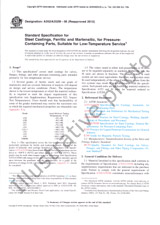We need your consent to use the individual data so that you can see information about your interests, among other things. Click "OK" to give your consent.
ASTM F2381-19
Standard Test Method for Evaluating Trans-Vinylene Yield in Irradiated Ultra-High Molecular Weight Polyethylene Fabricated Forms Intended for Surgical Implants by Infrared Spectroscopy
Translate name
STANDARD published on 1.10.2019
The information about the standard:
Designation standards: ASTM F2381-19
Publication date standards: 1.10.2019
SKU: NS-975437
The number of pages: 5
Approximate weight : 15 g (0.03 lbs)
Country: American technical standard
Category: Technical standards ASTM
The category - similar standards:
Annotation of standard text ASTM F2381-19 :
Keywords:
crosslinking, FTIR (Fourier Transform Infrared), implant, trans-vinylene index, TVI, UHMWPE (ultra-high molecular weight polyethylene),, ICS Number Code 11.040.40 (Implants for surgery, prothetics and orthotics)
Additional information
| Significance and Use | ||||||
|
4.1 Published literature shows that the yield of radiolytic reactions that occur during radiation treatment increases with radiation dose level. Measurement of the products of these reactions can be used as an internal dosimeter. 4.2 Trans-vinylene unsaturations are formed during ionization treatment by abstraction of a hydrogen molecule, and to a lesser extent by the recombination of two adjacent alkyl free radicals that reside on the same chain. 4.3 Previous work generated calibration curves of trans-vinylene absorption area as a function of absorbed radiation dose, yielding a linear relationship for both gamma- and electron beam-irradiated polyethylene. 4.4 This data can be used to determine received dose as a function of position, assuming a calibration curve (TVI versus radiation dose level) is known for the particular material and radiation conditions used, and can be used to determine uniformity of dose level in irradiated polyethylene. |
||||||
| 1. Scope | ||||||
|
1.1 This test method describes the measurement of the number of trans-vinylene groups in ultra-high molecular weight polyethylene (UHMWPE) intended for use in medical implants. The material is analyzed by infrared spectroscopy. 1.2 This test method is based on Guide F2102. 1.3 The applicability of the infrared method has been demonstrated in other literature reports. This particular method, using the intensity (area) of the C-H absorption centered at 1370 cm-1 to normalize for the sample’s thickness, will be validated by an Interlaboratory Study (ILS) conducted according to Practice E691. 1.4 The values stated in SI units are to be regarded as standard. No other units of measurement are included in this standard. 1.5 This standard does not purport to address all of the safety concerns, if any, associated with its use. It is the responsibility of the user of this standard to establish appropriate safety, health, and environmental practices and determine the applicability of regulatory limitations prior to use. 1.6 This international standard was developed in accordance with internationally recognized principles on standardization established in the Decision on Principles for the Development of International Standards, Guides and Recommendations issued by the World Trade Organization Technical Barriers to Trade (TBT) Committee. |
||||||
| 2. Referenced Documents | ||||||
|



 Cookies
Cookies
